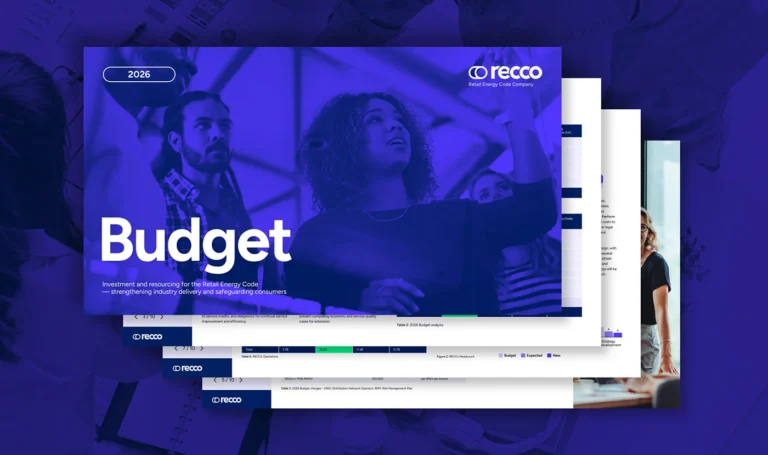New Tariff Interoperability Data Specification
As part of the energy system’s move toward greater flexibility and digitalisation, we’re working with DESNZ to develop a new Tariff Interoperability Data Specification. The aim? To make it easier for third-party service providers, such as Flexibility Service Providers, to access up-to-date tariff information in a consistent, secure, and efficient way. This will help unlock innovation, improve consumer choice, and support a smarter, more flexible energy system.
To find out more about the Tariff Interoperability Project and what this means in practice, we spoke with Chris Stock, Senior Responsible Officer (SRO) for the initiative at RECCo.
Hi Chris, what’s the Tariff Interoperability Data Specification, and what’s it aiming to achieve?
The Tariff Interoperability Data Specification is about creating a standardised way for energy suppliers to share their tariff data via Application Programming Interfaces (APIs), a set of rules and tools that let different software systems talk to each other.
By standardising the format and process, we’re reducing friction for new services and technologies to interact with this data, from price comparison and automated switching to smart device optimisation.
Ultimately, it’s about empowering consumers to get more value from their energy appliances, while supporting the wider shift to Net Zero.
How’s RECCo working with DESNZ on this specification?
DESNZ has asked RECCo to take the lead on designing and implementing this Data Specification, including developing any necessary changes to the Retail Energy Code (REC).
We’re working closely with DESNZ to ensure the approach aligns with government policy, and to run joint engagement and consultation activities, such as the monthly Tariff Interoperability Working Groups (TIWGs) and regular solution working groups.
We’re taking a collaborative approach, with RECCo acting as the delivery body and DESNZ providing policy direction and leading the introduction of the regulatory provisions (including Supplier Licence Conditions).
What progress has been made so far?
We’ve completed the discovery and early design stages, and we’re currently in the development stage, which includes:
- Running Tariff Interoperability Solution Working Groups (TISWGs) to shape the overall approach
- Drafting the standardised API Technical Specification that suppliers would use to build their API
- Outlining a standardised tariff data format to ensure consistency
- Preparing early drafts of the governance and assurance framework within the REC
We’re now preparing for a formal consultation in October 2025, which will shape the final version of the Data Specification and how it’s adopted.
How will the changes be progressed through the REC?
The REC already governs a range of digital and data-driven processes across the retail energy market, from switching to metering, so it’s a natural home for this work. Proposed changes are expected to include:
- A new schedule setting out the API Technical Specification
- Rules around performance monitoring and compliance
- Security and access protocols
- Supporting governance and assurance measures
As mentioned earlier, we’re working closely with industry and DESNZ through the TIWGs to develop the solution, which will go out for consultation in October for industry feedback. The feedback will then be reviewed, and changes will be implemented.
Can you tell us more about the upcoming consultation?
The consultation in October will ask for views on:
- Scope and structure of the API technical specification
- Tariff data to be included in the Tariff structure
- How access, security, and performance should be governed
- How the Data Specification can support both innovation and consumer protection
This is a joint consultation, led by DESNZ, and we really encourage suppliers, tech vendors, consumer representatives, and other codes to get involved. This is a chance to co-design something that will underpin how tariffs work in a digital, consumer-first energy system.
What kind of feedback will DESNZ and RECCo be looking for?
We’ll be particularly interested in:
- Ensuring the Data Specification is technically practical
- Making sure it works for both suppliers and third parties
- Identifying any unintended barriers or complexity
- Validating the proposed assurance and oversight approach
- Ensuring the regulatory provisions work for industry
This is about building something future proof, so we welcome challenge and insight.
How can stakeholders stay engaged?
We’ll be keeping stakeholders informed and involved through:
- Regular updates on the REC Portal and weekly REC Bulletins
- Regular updates on the RECCo website and Inside RECCo Newsletters
- Speaking to your Operational Account Manager if you’re a REC Party or Third-Party Intermediary
- Opportunities to review and comment on draft documents during the joint RECCo/DESNZ consultation in October 2025
About Chris Stock
Chris joined RECCo in November 2023 and is the Senior Responsible Officer (SRO) for the Tariff Interoperability Project. With over a decade of experience in the energy industry, Chris has played a key role in several RECCo projects, including Prepayment Levelisation and the ongoing Consumer Consent Solution.
Find out more
- Read our previous news article on DESNZ confirms the Retail Energy Code will host new Tariff Data Specification
- If you have any questions, contact chris.stock@retailenergycode.co.uk









